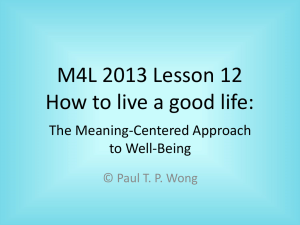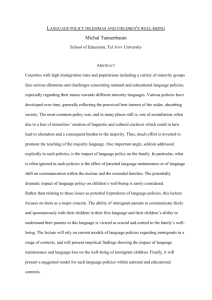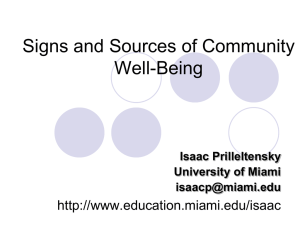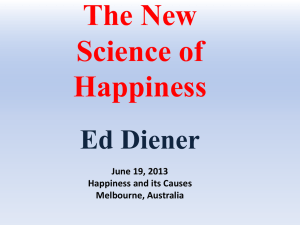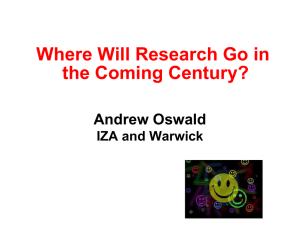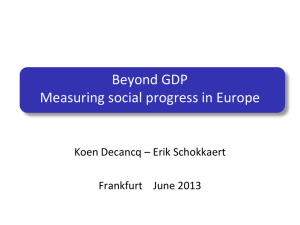The Economics of Well-Being syllabus (subject to
advertisement
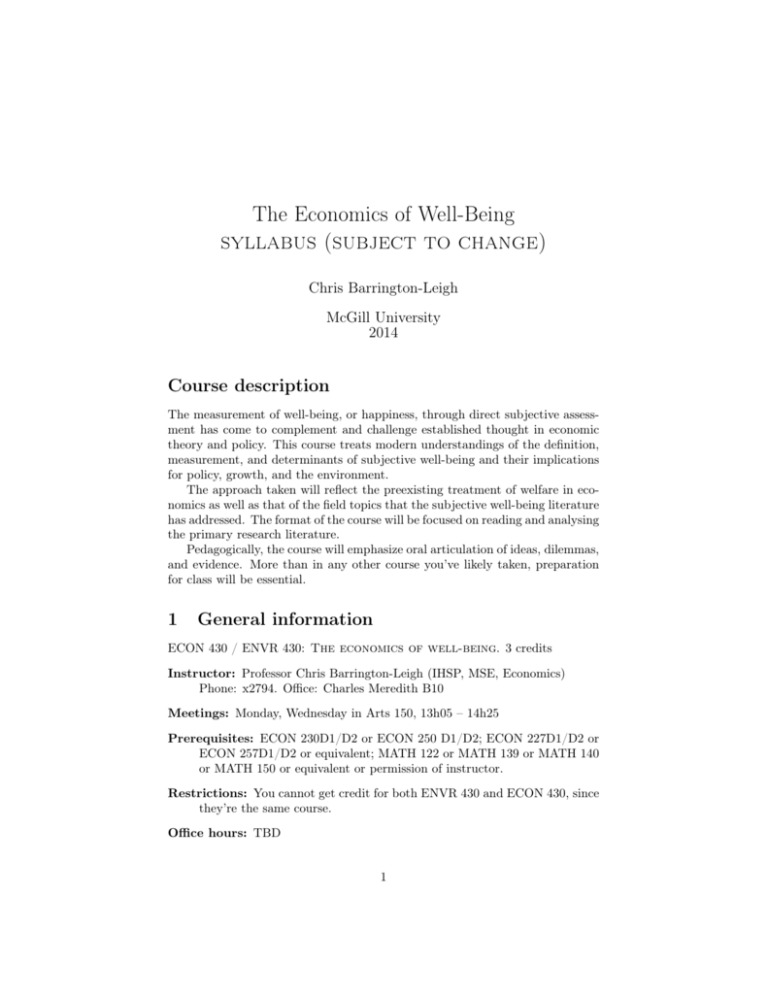
The Economics of Well-Being syllabus (subject to change) Chris Barrington-Leigh McGill University 2014 Course description The measurement of well-being, or happiness, through direct subjective assessment has come to complement and challenge established thought in economic theory and policy. This course treats modern understandings of the definition, measurement, and determinants of subjective well-being and their implications for policy, growth, and the environment. The approach taken will reflect the preexisting treatment of welfare in economics as well as that of the field topics that the subjective well-being literature has addressed. The format of the course will be focused on reading and analysing the primary research literature. Pedagogically, the course will emphasize oral articulation of ideas, dilemmas, and evidence. More than in any other course you’ve likely taken, preparation for class will be essential. 1 General information ECON 430 / ENVR 430: The economics of well-being. 3 credits Instructor: Professor Chris Barrington-Leigh (IHSP, MSE, Economics) Phone: x2794. Office: Charles Meredith B10 Meetings: Monday, Wednesday in Arts 150, 13h05 – 14h25 Prerequisites: ECON 230D1/D2 or ECON 250 D1/D2; ECON 227D1/D2 or ECON 257D1/D2 or equivalent; MATH 122 or MATH 139 or MATH 140 or MATH 150 or equivalent or permission of instructor. Restrictions: You cannot get credit for both ENVR 430 and ECON 430, since they’re the same course. Office hours: TBD 1 2 McGill policy statements c Instructor generated course materials (e.g., handouts, notes, summaries, 1. exam questions, etc.) are protected by law and may not be copied or distributed in any form or in any medium without explicit permission of the instructor. Note that infringements of copyright can be subject to follow up by the University under the Code of Student Conduct and Disciplinary Procedures. 2. McGill has policies on sustainability, paper use and other initiatives to promote a culture of sustainability at McGill. 3 3. McGill University values academic integrity. Therefore, all students must understand the meaning and consequences of cheating, plagiarism and other academic offences under the Code of Student Conduct and Disciplinary Procedures (see www.mcgill.ca/students/srr/honest/ for more information). 4. In accord with McGill University’s Charter of Students’ Rights, students in this course have the right to submit in English or in French any written work that is to be graded. 5. Additional policies governing academic issues which affect students can be found in the McGill Charter of Students’ Rights (The Handbook on Student Rights and Responsibilities is available at www.mcgill.ca/files/secretariat/Handbookon-Student-Rights-and-Responsibilities-2010.pdf). Course content The new science of well-being is necessarily multi-disciplinary. We will approach the material as economists, but we will spend time thinking about the psychological evidence as well as the inevitable philosophical considerations that come with trying to address the meaning of life, or the valuation of experience, or overarching policies for human society. Nevertheless, some mathematical arguments are essential to understand the ideas that have emerged in the study of subjective well-being. In addition, the insights we have from subjective well-being are above all highly empirical. Accordingly, the course includes some theoretical problems as well as a module in which students will run their own regressions on real cross-sectional and panel data involving life satisfaction. Discussing human well-being raises issues related to all of the current “crises of capitalism” under discussion by prominent economists, including big questions about the level of our material consumption, our impact on the planet, and the tradeoffs usually thought to justify these. We will cover theory, empirical evidence, and implications for policy. The subject is now deep and rapidly evolving, and our treatment will represent only an introduction and overview of each topic. See the reading list for details. 4 Learning outcomes By the end of this course students should be conversant regarding the outlines of the major contributions from well-being research. Specific goals are to be able to: 2 Outcome Orally articulate arguments to peers and synthesize group ideas Be able to explain, defend, and critique role of new subjective well-being literature in economics Contrast and compare different approaches to the measurement of welfare and progress Interpret empirical findings in primary literature Understand and classify relevant econometric methods Carry out basic life satisfaction regressions using survey data 5 Assessment class response homework, quizzes, and class response homework, quizzes, and class response homework, quizzes, and class response homework, quizzes, and class response lab Instructional method The course will be structured around readings done outside class in preparation for working together during class time. The instructor will be a guide, rather than a mere lecturer, and class time will largely be dedicated to working through concepts with peers. Students will be called upon to respond to conceptual questions after having had a chance to discuss them with peers. N.B.: Class time is precious. Students must (a) arrive on time, with paper and pen, (b) stay mobile enough to be ready to move around the room multiple times during class, (c) put away all electronic devices and other material unrelated to class. Distracting or distracted behaviour are not appropriate for this course. Course instruction has the following elements: • preparation for class (essential) • regular homework assignments will guide thinking during reading and preparation, and will form the basis for discussion and collaborative learning in class • occasional talks by the instructor on concepts, methods, and important papers • students will do most of the in-class “teaching” through one-on-one and small-group exercises and discussions • regular quizzes, as part of interpreting and analysing concepts and methods, will reflect readings and class discussion • one empirical exercise in which we will analyze real data 3 6 Course materials • A light-reading book: P Richard G Layard (2011). Happiness: Lessons from a new science. Penguin UK (to buy; available at the bookstore) • U.N. (2012). World Happiness Report. columbia.edu/articles/view/2960 url: http : / / www . earth . • U.N. (2013). World Happiness Report. url: http://unsdsn.org/files/ 2013/09/WorldHappinessReport2013_online.pdf • Daniel Nettle (2005). Happiness: The science behind your smile. Oxford University Press (available as ebook at McGill Library) • Primary literature from the reading list • Secondary and popular writing (available online) • Econometric software (R), open source and free • Publicly available and/or individually licensed datasets • EdX course on Happiness (UC Berkeley) • http://authentichappiness.org • McGill’s MyCourses 7 Assignments and evaluation (subject to revision) Generally, you will have an assignment for every class after the first day. You will have several questions to guide or provoke your thinking in the reading due for that day. Your homeworks must be printed out, double-sided, before class. You will refer to them during class but will hand them in (without further annotation) at the end of class. Each week, one more or more questions among those you’ve submitted will be graded. These assignments will be worth 2 21 % per week. You should aim to come to class with your own additional thoughts and questions provoked by the reading. Once in class, you will share what you’ve learned, solidify concepts, and debate the various contentious issues on which we’ll touch. I will call on individuals randomly to answer questions that I’ve posed on the spot, as well as to report on your answers to the homework or other questions, but only after you have had a chance to articulate and discuss them with classmates. These responses will also be (gently) graded. We will also have short quizzes in class, mostly on the same day that we will have other class activities. At the end of the term, each student will arrange a 5-minute chat with me which will serve as a comprehensive oral quiz. There will be no final exam during the skiing period. 4 The distributed nature of the grading scheme is designed to ensure that every single effort is low-pressure on the student, but that continuous participation, effort, and engagement is sustained throughout the term. My pedagogical objective is empowerment of students to sound (and be) smart (skilled and articulate) outside of the class and after the course. Class time is successful when as many minds as possible are actively engaged at any moment. Students will not be competing with each other for marks. The more we work together to deepen our understanding of concepts, the better all students will perform in the course. The breakdown of marks is as follows: Also because there are numerous assignments, no late work will be accepted. I will drop the lowest weekly score from your homeworks and the lowest score from your in-class contributions, to account for possible medical absences. Missed quizzes will earn a zero unless a doctor’s note is provided, in which case your score on the missed quiz will be whatever you get on the last (oral) quiz. There’s not much substitute for full participation in this course. Activity In-class responses and contributions Daily assignments (12 weeks) Quizzes (4 or 5) 8 Weight 20% 30% 50% Written work This course, like life, emphasizes and rewards oral and written articulation of ideas. There is writing to be done every week, though it is short-response. I will be grading a randomly-chosen subset of each week’s assignments. Here are some important considerations for your written work: 1. Keep it succinct: each unnecessary, unclear, or ambiguous sentence counts against your score, just like coherent and salient sentences increase your score. 2. Grammar, spelling, and punctuation matter. Follow the rules of formal written communication. You may need to work with a proof-reader, language coach, or appropriate software to achieve this end. 9 Responsibilities My responsibilities are to come to class prepared; to respond to questions and to encourage broad participation in class discussion; to provide timely results on graded problems and assignments; and to stimulate an enthusiasm for economics, for critical thinking, and for learning. Your responsibilities are to attend and participate actively in class; to arrive on time and prepared; to complete readings and assignments as scheduled (allowing time to re-read difficult material); to learn from and contribute to your 5 peers’ understanding; to seek help if you are struggling; and to strive, where given the opportunity, to make the material interesting and relevant to your own passions and ideas. 10 Academic Integrity (my version) Students are encouraged both to help to teach each other difficult concepts and to collaborate on working through problems and discussing assignments. Because the target skills in this course emphasize oral and written articulation of ideas, you may learn as much from working with your diverse peers as you do from me or the text. However, for computer-based, in-class, and problemsolving questions, you must ultimately write up your own solutions without copying from other students’, or enter your own answer which you can defend independently. For expository answers, writing must be in your own words, and ideas of others’ must be cited. When you have worked in a group and your assignment represents the ideas of more than one person, you should recognise your collaborators by listing their names at the beginning of your assignment. This will not detract from your grade, but will rather let me know that you are, as intended, benefiting from group work. To reiterate from the McGill policy, no course materials may be shared at all with anyone outside of this term’s cohort. 6 11 Course schedule Detailed weekly reading assignments will be released as we go. Date W Sep 3 M Sep 9 W Sep 10 M Sep 15 W Sep 17 M Sep 22 M Sep 22 W Sep 24 M Sep 29 W Oct 1 M Oct 6 M Oct 6 W Oct 8 M Oct 13 M Oct 15 M Oct 20 W Oct 22 M Oct 27 W Oct 29 M Nov 3 W Nov 5 W Nov 5 M Nov 10 W Nov 12 M Nov 17 W Nov 19 M Nov 24 W Nov 26 M Dec 1 Topic Course introduction Well-being and economics Utilitarianism, philosophy, and measurement Utilitarianism, philosophy, and measurement Positive psychology Quiz 1 Well-being, Adaptation Adaptation Adaptation income, and growth and Veblen effects and Veblen effects and Veblen effects Quiz 2 Empirical methods Analysis in R Thanksgiving (no class) Empirical lab Happiness and development Social capital Social capital Labour; macro Inequality and distributional issues Quiz 3 Environment Affective forecasting Affective forecasting Behaviour Cost benefit analysis and policy Aggregation and indicators Aggregation and indicators Quiz 4 / spare day Oral exams (scheduled individually) W Dec 3 Thurs Dec 4 Wrap up 7 Reading topics: supplemental references Economic growth A basic question which initiated the field of SWB in Economics is, “Does economic growth, or increased economic performance, lead to happier societies?” As for each of the topics to follow, we will assess the evidence and its implication for standard welfare measures and theorems. A. Deaton (2008). “Income, health and wellbeing around the world: Evidence from the Gallup World Poll”. In: Journal of Economic Perspectives 22.2, p. 53 Richard A. Easterlin (1995). “Will raising the incomes of all increase the happiness of all?” In: Journal of Economic Behavior & Organization 27.1, pp. 35–47 Richard A. Easterlin and Anke C. Plagnol (2008). “Life satisfaction and economic conditions in East and West Germany pre- and post-unification”. In: Journal of Economic Behavior & Organization 68.3-4, pp. 433–444. issn: 0167-2681. doi: 10.1016/j.jebo.2008.06.009 Daniel Kahneman and Angus Deaton (2010). “High income improves evaluation of life but not emotional well-being”. In: Proceedings of the National Academy of Sciences 107.38, pp. 16489–16493. doi: 10 . 1073 / pnas . 1011492107. eprint: http://www.pnas.org/content/107/38/16489. full.pdf+html B. Stevenson and J. Wolfers (2008a). “Economic growth and subjective wellbeing: Reassessing the Easterlin paradox”. In: National Bureau of Economic Research working paper 14282 B. Van Praag (1971). “The welfare function of income in Belgium: An empirical investigation”. In: European Economic Review 2.3, pp. 337–369 B.M.S. Van Praag and A. Kapteyn (1973). “Further evidence on the individual welfare function of income: An empirical investigation in The Netherlands”. In: European Economic Review 4.1, pp. 33–62 A.J. Oswald (1997). “Happiness and Economic Performance”. In: The Economic Journal 107.445, pp. 1815–1831 Unemployment, inflation, and business cycles Besides growth, other macroeconomic measures might also show effects on wellbeing at an aggregate level. Special attention has been given to inflation and unemployment, with their relevance to central bank policy. Angus S. Deaton (2011). “The Financial Crisis and the Well-Being of Americans”. In: Working Paper Series 17128 R. Di Tella, R.J. MacCulloch, and A.J. Oswald (2001). “Preferences over inflation and unemployment: Evidence from surveys of happiness”. In: American Economic Review, pp. 335–341. issn: 0002-8282 8 Rafael Di Tella and Robert MacCulloch (2007). Happiness, Contentment and Other Emotions for Central Banks. Working Paper 13622. National Bureau of Economic Research Consumption externalities and “Veblen effects” Economists have always expected that current individual utility will depend on the consumption levels of others and of other times, in addition to own instantaneous consumption. However, this idea was deemphasized in the latter part of the 20th Century. A major contribution of the SWL literature is to offer a new way to quantify such effects. L.S. Bagwell and B.D. Bernheim (1996). “Veblen Effects in a Theory of Conspicuous Consumption”. In: The American Economic Review 86.3, pp. 349– 373 B.C. Eaton and M. Eswaran (2009). “Well-being and Affluence in the Presence of a Veblen Good”. In: The Economic Journal 119.539, pp. 1088–1104 Curtis Eaton and Mukesh Eswaran (2003). “The evolution of preferences and competition: a rationalization of Veblen’s theory of invidious comparisons”. In: Canadian Journal of Economics 36.4. available at http://ideas.repec.org/a/cje/issued/v36y200 859.html, pp. 832–859 A. Falk and M. Knell (2004). “Choosing the Joneses: Endogenous Goals and Reference Standards”. In: Scandinavian Journal of Economics 106.3, pp. 417–435 R.H. Frank (1997). “The Frame of Reference as a Public Good”. In: The Economic Journal 107.445, pp. 1832–1847 H. Leibenstein (1950). “Bandwagon, Snob, and Veblen Effects in the Theory of Consumers’ Demand”. In: The Quarterly Journal of Economics 64.2, pp. 183–207 Erzo F. P. Luttmer (2005). “Neighbors as Negatives: Relative Earnings and Well-Being”. In: Quarterly Journal of Economics 120.3, pp. 963–1002 D. Neumark and A. Postlewaite (1998). “Relative Income Concerns and the Rise in Married Women’s Employment”. In: Journal of Public Economics 70.1, pp. 157–83 J.L. Vigdor (2006). “Fifty Million Voters Can’t Be Wrong: Economic SelfInterest and Redistributive Politics”. In: NBER Working Paper Social capital and social contact Measures of the strength of trust and other social liens have traditionally been studied as a form of capital in the context of transaction costs and economic efficiency. Use of SWB as a welfare measure has led to the compelling idea that much of our utility comes from the the process of interacting, and the degree or nature of social capital, regardless of instrumental outcomes. George A. Akerlof (1997). “Social Distance and Social Decisions”. In: Econo- 9 metrica 65.5. available at http://ideas.repec.org/a/ecm/emetrp/v65y1997i5p10051028.html, pp. 1005–1028 Daniel J. Benjamin, James J. Choi, and A. Joshua Strickland (2007). Social Identity and Preferences. Working Paper 13309. National Bureau of Economic Research J.F. Helliwell (2003). “How’s life? Combining individual and national variables to explain subjective well-being”. In: Economic Modelling 20.2, pp. 331– 360 J.F. Helliwell (2004). Well-Being and Social Capital: Does Suicide Pose a Puzzle? The labour market and the workplace Economists have always considered the tradeoffs made in the workplace, where work conditions are valued against the wage. SWB data provide a new way to calculate compensating differentials, ie to evaluate in income terms the various aspects of work life. Matthias Benz and Bruno S. Frey (2008). “The value of doing what you like: Evidence from the self-employed in 23 countries”. In: Journal of Economic Behavior & Organization 68.3-4, pp. 445–455. issn: 0167-2681. doi: 10.1016/j.jebo.2006.10.014 Betsey Stevenson and Justin Wolfers (2008b). “The Paradox of Declining Female Happiness” Adaptation effects Another form of consumption externality is one’s own past habits. To what extent does SWB show permanent shifts in well-being after major, permanent positive and negative shocks? There is also a principal-agent evolutionary model for our affective response systems. R. Di Tella, J. Haisken-De New, and R. MacCulloch (2005). “Adaptation to Income and to Status in an Individual Panel”. In: Unpublished working paper, Harvard Business School, Boston, MA L. Rayo and G.S. Becker (2004). “Evolutionary Efficiency and Mean Reversion in Happiness”. In: mimeographed, University of Chicago A. Stutzer (2004). “The Role of Income Aspirations in Individual Happiness”. In: Journal of Economic Behavior and Organization 54.1, pp. 89–109 Andrew J. Oswald and Nattavudh Powdthavee (2008). “Does happiness adapt? A longitudinal study of disability with implications for economists and judges”. In: Journal of Public Economics, 92.5-6, pp. 1061–1077 10 Inequality and distribution A. Alesina, R. Di Tella, and R. MacCulloch (2004). “Happiness and Inequality: Are Europeans and Americans Different?” In: Journal of Public Economics 88.9-10, pp. 2009–2042 Claudia Senik (2004). “When information dominates comparison: Learning from Russian subjective panel data”. In: Journal of Public Economics 88.9-10, pp. 2099–2123. issn: 0047-2727. doi: 10.1016/S0047-2727(03) 00066-5 N. Tomes (1986). “Income distribution, happiness, and satisfaction: A Direct Test of the Interdependent Preferences Model”. In: Journal of Economic Psychology 7.4, pp. 425–46 Jean-Benoît G. Rousseau (2009). “Happiness and Income Inequality”. In: CIRANO Public Policy Group Working Paper Development G.G. Kingdon and J. Knight (2007). “Community, Comparisons and Subjective Well-being in a Divided Society”. In: Journal of Economic Behaviour and Organization Methodology Psychological and econometric issues both present special challenges to the analysis of SWB. A great deal of work has gone in to understanding the robustness and meaning of SWB, and to comparing and developing techniques for the analysis of latent response variables in panel (and cross-sectional) data. M. Bertrand and S. Mullainathan (2001). “Do People Mean What They Say? Implications for Subjective Survey Data”. In: The American Economic Review 91.2, pp. 67–72 Alan B. Krueger and David A. Schkade (2008). “The reliability of subjective well-being measures”. In: Journal of Public Economics 92.8-9, pp. 1833– 1845 G. Loewenstein (2000). “Emotions in Economic Theory and Economic Behavior”. In: The American Economic Review 90.2, pp. 426–432 B.M.S. van Praag, P. Frijters, and A. Ferrer-i-Carbonell (2003). “The anatomy of subjective well-being”. In: Journal of Economic Behavior and Organization 51.1, pp. 29–49 A. Ferrer-i-Carbonell and P. Frijters (2004). “How Important is Methodology for the estimates of the determinants of Happiness?” In: The Economic Journal 114.497, pp. 641–659 Environment Many economists have noted the implications for evaluating environmental costs if welfare implications of growth are revised. However, there is also interest in 11 direct benefits and costs of environmental amenities and pollution. Y. K. Ng (2003). “From preference to happiness: towards a more complete welfare economics”. English. In: Social choice and welfare 20.2, pp. 307– 350 Heinz Welsch (2002). “Preferences over Prosperity and Pollution: Environmental Valuation based on Happiness Surveys”. In: Kyklos 55.4, pp. 473–494. issn: 1467-6435. doi: 10.1111/1467-6435.00198 P. Frijters and B. M. S. Van Praag (1998). “The Effects of Climate on Welfare and Well-Being in Russia”. In: Climatic Change 39 (1). 10.1023/A:1005347721963, pp. 61–81. issn: 0165-0009 Simon Luechinger (2009). “Valuing Air Quality Using the Life Satisfaction Approach”. In: The Economic Journal 119.536, pp. 482–515. issn: 14680297. doi: 10.1111/j.1468-0297.2008.02241.x Simon and Luechinger (2010). “Life satisfaction and transboundary air pollution”. In: Economics Letters 107.1, pp. 4–6. issn: 0165-1765. doi: 10.1016/j.econlet.2009.07.007 Nick Carroll, Paul Frijters, and Michael Shields (2009). “Quantifying the costs of drought: new evidence from life satisfaction data”. In: Journal of Population Economics 22 (2). 10.1007/s00148-007-0174-3, pp. 445–461. issn: 0933-1433 Simon Luechinger and Paul A. Raschky (2009). “Valuing flood disasters using the life satisfaction approach”. In: Journal of Public Economics 93.3-4, pp. 620–633 B.M.S. van Praag and B.E. Baarsma (2005). “Using Happiness Surveys to Value Intangibles: The Case of Airport Noise*”. In: The Economic Journal 115.500, pp. 224–246 Intertemporal preferences Assumptions on intertemporal preferences are at the core of macroeconomics and environmental economics. Again, subjective well-being offers a new way to investigate these tradeoffs. G. Loewenstein, T. O’Donoghue, and M. Rabin (2003). “Projection bias in predicting future utility”. In: The Quarterly Journal of Economics 118.4, pp. 1209–1248 Other Other factors have been found to predict SWB reports and are important at least to understand their role as controls. These include the role of religion, age, gender, and other demographic variables. Bruno Frey, Simon Luechinger, and Alois Stutzer (2009). “The life satisfaction approach to valuing public goods: The case of terrorism”. In: Public 12 Choice 138.3. 10.1007/s11127-008-9361-3, pp. 317–345 Religion A.E. Clark and O. Lelkes (2009). “Let us pray: religious interactions in life satisfaction”. In: Paris School of Economics Working Papers D.G. Blanchflower and A.J. Oswald (2008). “Is well-being U-shaped over the life cycle?” In: Social Science & Medicine 66.8, pp. 1733–1749 Reviews There are a number of worthwhile reviews of the SWB literature. P. Dolan, T. Peasgood, and M. White (2008). “Do we really know what makes us happy? A review of the economic literature on the factors associated with subjective well-being”. In: Journal of Economic Psychology 29.1, pp. 94–122. issn: 0167-4870 D. Kahneman and A.B. Krueger (2006). “Developments in the measurement of subjective well-being”. In: Journal of Economic Perspectives 20.1, pp. 3– 24 George MacKerron (2011). “Happiness economics from 35000 feet”. In: Journal of Economic Surveys. issn: 1467-6419. doi: 10.1111/j.1467- 6419. 2010.00672.x Rafael Di Tella and Robert MacCulloch (2006). “Some Uses of Happiness Data in Economics”. In: Journal of Economic Perspectives 20.1, pp. 25–46. eprint: http : / / ideas . repec . org / a / aea / jecper / v20y2006i1p25 46.html B.S. Frey and A. Stutzer (2002). “What Can Economists Learn from Happiness Research?” In: Journal of Economic Literature 40.2, pp. 402–435 13


